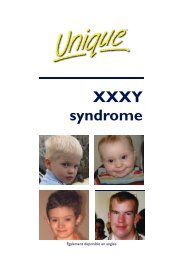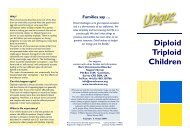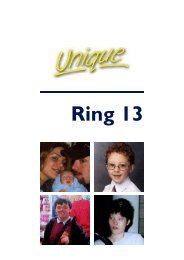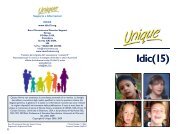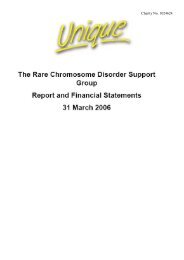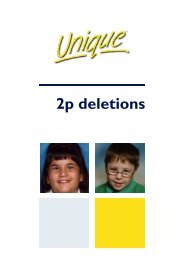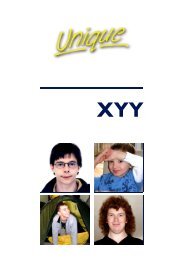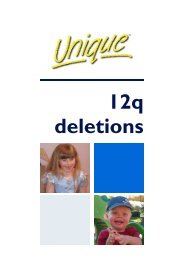19p13.2 microdeletions - Unique The Rare Chromosome Disorder ...
19p13.2 microdeletions - Unique The Rare Chromosome Disorder ...
19p13.2 microdeletions - Unique The Rare Chromosome Disorder ...
You also want an ePaper? Increase the reach of your titles
YUMPU automatically turns print PDFs into web optimized ePapers that Google loves.
eported not to affect their breathing (<strong>Unique</strong>). In the medical literature, an individual<br />
with a deletion extending into the neighbouring 19p13.13 region had a curved upper spine<br />
(kyphosis) and craniosynostosis (an irregularly-shaped skull). This child also had<br />
microcephaly, a small head, and arthrogryposis of the lower limbs (a neuro-musculoskeletal<br />
disorder that affects various joints in the body) (Lysy 2009). A curved upper spine<br />
is also reported in another child (Decipher). Scoliosis (a curved spine) and pectus<br />
carinatum (pigeon chest – protrusion of the sternum and ribs) occurs in one child, who<br />
has frequent fractures (Decipher).<br />
Other medical concerns are described with low frequency, or occur quite commonly<br />
in the general population, and also may not be related to the microdeletion of <strong>19p13.2</strong>.<br />
Four boys have hypospadias (<strong>Unique</strong>, Decipher). This is a relatively common birth defect,<br />
affecting between 1 in 125 and 1 in 300 male babies. It occurs when the hole through<br />
which urine and semen leave the body is not located at the tip of the head of the penis.<br />
Surgery is sometimes used to correct the defect. Another <strong>Unique</strong> member had<br />
undescended testicles and double hernias. Surgery was performed at six weeks old.<br />
One <strong>Unique</strong> member had developed kidney stones at six years and has about one stone a<br />
year. He has haematuria (blood in the urine), lowered kidney function and recurrent<br />
urinary tract infections, requiring antibiotic treatment. Small kidney stones (less than<br />
5mm) can be passed in the urine; larger stones may need hospital treatment. For<br />
example, lithotripsy, high energy shock waves, can be used to break the stone into<br />
smaller pieces which can be passed painlessly in the urine. Another child has had kidney<br />
cysts recently diagnosed (at 16 years old) (<strong>Unique</strong>).<br />
One child has mild cerebral palsy (<strong>Unique</strong>). This is one of a group of neurological<br />
conditions (affecting the brain and nervous system) that influence a child’s movement<br />
and co-ordination. Cerebral palsy is caused by damage to the brain, which normally<br />
occurs before, during or soon after birth. A team of specialists, for example, speech<br />
therapists, occupational therapists, physiotherapists and a paediatrician may be involved<br />
in treating cerebral palsy.<br />
Transient erythroblastopenia of childhood (TEC) was diagnosed in one child with a<br />
microdeletion of <strong>19p13.2</strong> (<strong>Unique</strong>). This is a slowly developing anaemia that occurs in<br />
early childhood and is characterized by an increasingly pale skin. <strong>The</strong> child was given a<br />
blood transfusion. As the name suggests, patients with TEC recover completely.<br />
One teenager has had dysfunctional menstrual bleeding and has been diagnosed with von<br />
Willebrand disease (<strong>Unique</strong>). People with this condition either have a deficiency of a blood<br />
protein called von Willebrand factor, or this protein doesn't work correctly. It means that<br />
their blood doesn’t clot properly and they are prone to bleeding. It is an inherited<br />
condition and 1-2 per cent (1-2 in 100 people) of the UK population has reduced levels of<br />
von Willebrand factor; however, only about 1 in 1000 people has symptoms that might<br />
require medical attention.<br />
Two <strong>Unique</strong> members have hypothyroidism, an underactive thyroid gland. This is a<br />
condition in which there is a reduced level of thyroid hormone (thyroxine) in the body.<br />
Various symptoms result, the most common being: tiredness, weight gain, constipation,<br />
aches, dry skin, lifeless hair and feeling cold. Hypothyroidism can be successfully treated<br />
by a daily tablet to replace the missing thyroxine.<br />
Two children have high cholesterol. One of these also has low testosterone and coeliac<br />
disease (a common digestive condition where a person has an adverse reaction to gluten;<br />
21



